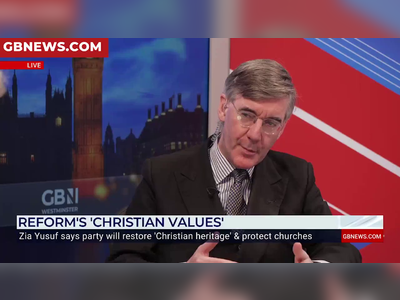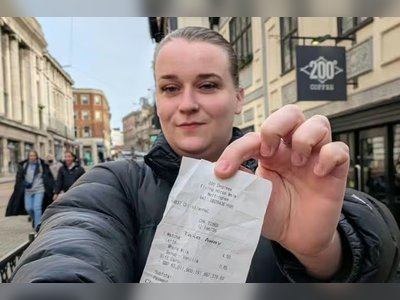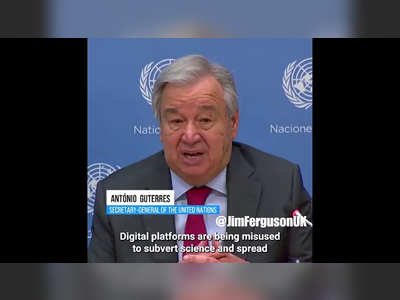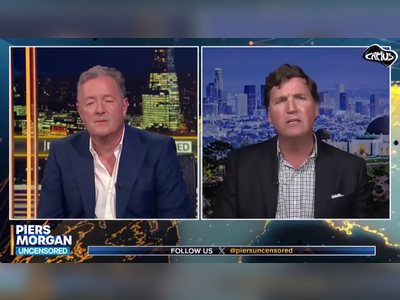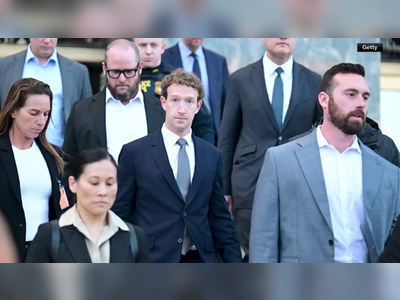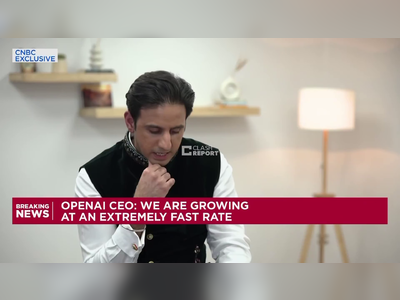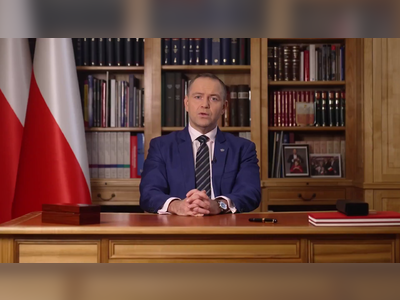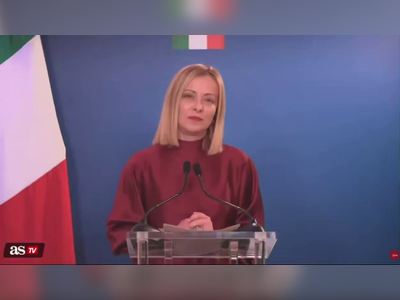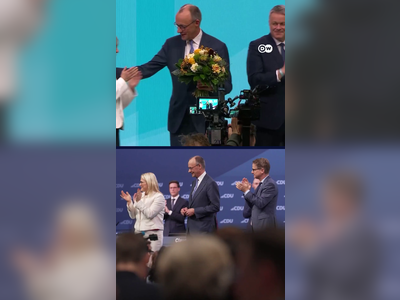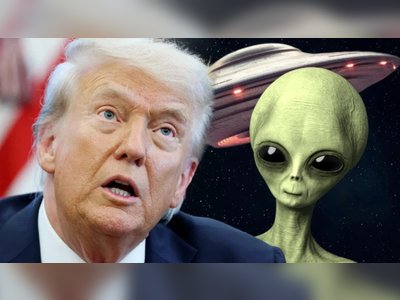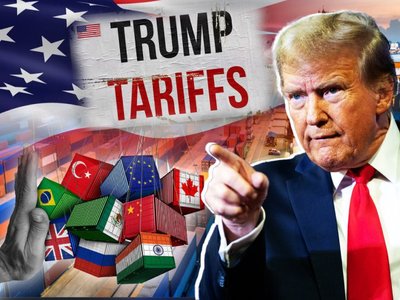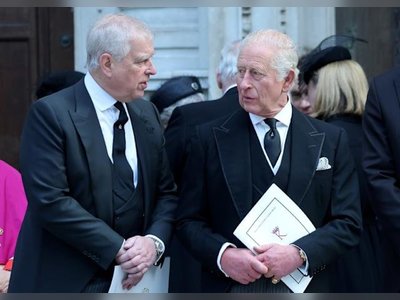United States Bids Farewell to Jimmy Carter with State Funeral in Washington
A solemn gathering of dignitaries and global leaders pays tribute to Carter's legacy of humanitarian work and peace efforts.
On Thursday, Washington, D.C. witnessed a state funeral for Jimmy Carter at the National Cathedral, marking the final farewell to a pivotal figure in American history.
The ceremony saw an assembly of current and former leaders, including President Joe Biden, President-elect Donald Trump, former presidents Barack Obama, George W.
Bush, and Bill Clinton, and Canadian Prime Minister Justin Trudeau, gathered to honor Carter, who served as the 39th President of the United States from 1977 to 1981.
The service commenced with a eulogy by Carter’s grandson, Joshua Carter, who reflected on his grandfather’s life, inspired by his Christian faith, as one dedicated to service.
"My grandfather spent his life helping the needy, building homes, eradicating diseases, and fostering peace," he recounted.
President Joe Biden, in his tribute, emphasized Carter’s character as the "greatest of his attributes." He recalled supporting Carter’s presidential campaign in 1976 due to the former president’s integrity.
Biden remarked, "The friendship with Jimmy Carter taught me that strength of character is more significant than title or power."
Biden praised Carter for never allowing politics to deviate him from his mission of service, stating that Carter's life story is a testament to faith in humanity and the best of America.
He described Carter as a man whose life spanned from humble beginnings to the heights of political power, yet remained committed to civil rights and humanitarian causes.
Ted Mondale, son of Carter's Vice President Walter Mondale, also paid tribute, recognizing Carter’s vision and foresight in addressing long-term challenges, often at the cost of short-term political gains.
Throughout the event, Carter was remembered for his humanitarian efforts and his critical role in achieving the Camp David Accords, the first Middle East peace deal between Egypt and Israel, in 1979.
This, along with his later life’s work through the Carter Center and Habitat for Humanity, earned him the Nobel Peace Prize in 2002.
Having ascended to the presidency following the post-Watergate era, Carter’s path to the White House concluded with a victory over incumbent Gerald Ford in 1976, forging an unexpected lifelong friendship with his former political adversary.
Despite the challenges faced during his presidency, including the Iran hostage crisis, Carter’s post-presidential legacy grew significantly.
His remains were transported from the Capitol Rotunda, where they lay in state, back to his hometown of Plains, Georgia, for a private service.
Many Americans, spanning generations, gathered to pay their respects, underscoring Carter’s lasting impact on the nation's moral compass.
Among the attendees at the Washington funeral were notable current and former political figures, highlighting the broad recognition of Carter's contributions.
The gathering also served as a rare moment of unity, notably the first meeting of Trump and Pence since their administration ended.
Carter’s presidency, marked by its contradictions, nonetheless left a lasting legacy through his post-presidential humanitarian efforts.
The Carter Center has played a significant role in global health and human rights advocacy, a testament to his unwavering commitment to peace and justice long after leaving office.
The ceremony saw an assembly of current and former leaders, including President Joe Biden, President-elect Donald Trump, former presidents Barack Obama, George W.
Bush, and Bill Clinton, and Canadian Prime Minister Justin Trudeau, gathered to honor Carter, who served as the 39th President of the United States from 1977 to 1981.
The service commenced with a eulogy by Carter’s grandson, Joshua Carter, who reflected on his grandfather’s life, inspired by his Christian faith, as one dedicated to service.
"My grandfather spent his life helping the needy, building homes, eradicating diseases, and fostering peace," he recounted.
President Joe Biden, in his tribute, emphasized Carter’s character as the "greatest of his attributes." He recalled supporting Carter’s presidential campaign in 1976 due to the former president’s integrity.
Biden remarked, "The friendship with Jimmy Carter taught me that strength of character is more significant than title or power."
Biden praised Carter for never allowing politics to deviate him from his mission of service, stating that Carter's life story is a testament to faith in humanity and the best of America.
He described Carter as a man whose life spanned from humble beginnings to the heights of political power, yet remained committed to civil rights and humanitarian causes.
Ted Mondale, son of Carter's Vice President Walter Mondale, also paid tribute, recognizing Carter’s vision and foresight in addressing long-term challenges, often at the cost of short-term political gains.
Throughout the event, Carter was remembered for his humanitarian efforts and his critical role in achieving the Camp David Accords, the first Middle East peace deal between Egypt and Israel, in 1979.
This, along with his later life’s work through the Carter Center and Habitat for Humanity, earned him the Nobel Peace Prize in 2002.
Having ascended to the presidency following the post-Watergate era, Carter’s path to the White House concluded with a victory over incumbent Gerald Ford in 1976, forging an unexpected lifelong friendship with his former political adversary.
Despite the challenges faced during his presidency, including the Iran hostage crisis, Carter’s post-presidential legacy grew significantly.
His remains were transported from the Capitol Rotunda, where they lay in state, back to his hometown of Plains, Georgia, for a private service.
Many Americans, spanning generations, gathered to pay their respects, underscoring Carter’s lasting impact on the nation's moral compass.
Among the attendees at the Washington funeral were notable current and former political figures, highlighting the broad recognition of Carter's contributions.
The gathering also served as a rare moment of unity, notably the first meeting of Trump and Pence since their administration ended.
Carter’s presidency, marked by its contradictions, nonetheless left a lasting legacy through his post-presidential humanitarian efforts.
The Carter Center has played a significant role in global health and human rights advocacy, a testament to his unwavering commitment to peace and justice long after leaving office.
Translation:
Translated by AI
AI Disclaimer: An advanced artificial intelligence (AI) system generated the content of this page on its own. This innovative technology conducts extensive research from a variety of reliable sources, performs rigorous fact-checking and verification, cleans up and balances biased or manipulated content, and presents a minimal factual summary that is just enough yet essential for you to function as an informed and educated citizen. Please keep in mind, however, that this system is an evolving technology, and as a result, the article may contain accidental inaccuracies or errors. We urge you to help us improve our site by reporting any inaccuracies you find using the "Contact Us" link at the bottom of this page. Your helpful feedback helps us improve our system and deliver more precise content. When you find an article of interest here, please look for the full and extensive coverage of this topic in traditional news sources, as they are written by professional journalists that we try to support, not replace. We appreciate your understanding and assistance.
